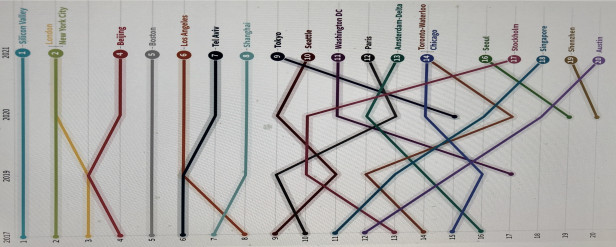In the recent past, the value of startups in Amsterdam Delta (Amsterdam metropolitan region) has taken a giant leap. In 2015, Amsterdam startups were valued at $11.1 billion. Today, Europe's number 3 ecosystem is worth $83.3 billion. The extraordinary success stories of Adyen and Takeaway have been a major contributor to this success, but its base is much broader. On the annually published Global Startup Ecosystem ranking Amsterdam Delta rose from the 19th place in 2015 to 12th place in 2020. Everyone was curious about the 2021 ranking. Well, as the table shows, Amsterdam Delta has been overtaken by Paris and Tokyo, but only lost one place due to a significant drop in Stockholm.
The value of rankings is easily overestimated. However, the value of startups should not be underestimated. More than 30% of the 4000 startups in the Netherlands are located in the Amsterdam metropolitan region. Together, the Dutch startups have created more than 100,000 jobs and are responsible for 60% of the annual job growth.
Globally, 2020 and 2021 were amazing years for startups as the pandemic fueled technology. According to the Global Startup Ecosystem Report 2021, Internet capacity increased by 35% and global broadband traffic by 51%. Consumers bought 30% more food online. Global venture capital funding nearly doubled to $288 billion in the first half of 2021, compared to the first half of 2020. Startups have benefited from the explosive technology market, supported by significant government support. Following China and the US, the European Union has been generous to startups, and the same goes for its member states. The Dutch government offers tax credits to innovative companies and environmentally friendly investments. The city of Amsterdam promotes startups that support inclusive growth and diversity, for example by subsidizing female entrepreneurs.
The Amsterdam Delta startup ecosystem can be characterized as vibrant. Still other ecosystems in the world are growing faster, including those in some European cities. In the global top ten emerging ecosystems, we find Copenhagen in second place and Barcelona, Madrid, and Zurich in places 5, 8 and 9.
To detect possible vulnerabilities in the Amsterdam Delta startup ecosystem, analyzing of success factors of the 30 highest-ranked ecosystems in the report is informative. In terms of performance, Amsterdam's composite score is in a middle position (6 out of 10 points). In terms of funding, the position is good (8). In terms of market reach, the overall score is satisfactory (7): The Amsterdam Delta startups are primarily focused on global markets and score low on the local market. Like most European ecosystems, Amsterdam Delta scores excellent (9) in connectedness, which is related to its strength on the global market. In terms of talent, the overall score is satisfactory (7), but the components differ considerably. The quality of technology students and graduates is good, but their number is insufficient, resulting in high salary costs. The scalability of the Amsterdam startup ecosystem is also insufficient, due to a lack of experience, which keeps many startups small. The overall knowledge success is assessed as poor (1) because the number of life science patents is disappointing.
When assessing the success factors, it should be considered that the population of Amsterdam Delta is about 10% of the population of London, and in this perspective the need to improve the global 13th place is not urgent. On the contrary, understanding why the Amsterdam Delta is performing so well is more relevant than looking for opportunities to improve it.
The explanation of Amsterdam's success has its roots in the fundamental strength of the Netherlands as a whole, which has at least ten other vibrant startup ecosystems. Against this background, one might be curious about the Global Startup Ecosystem ranking of the Randstad, including Eindhoven as a whole. According to the report, the strength of the Netherlands is its well-educated population, international orientation and English proficiency, excellent infrastructure, an 'extremely high quality of life' and business-friendly laws. Amsterdam is also the headquarters of many international companies, a large pool of potential startup founders.
In a next post, I will focus on Amsterdam's policy towards startups and evaluate whether a higher ranking is within reach or whether more qualitative objectives are preferable, taken into account the considerations in a former post on the Amsterdam Smart City website.
I will regularly share ‘snapshots’ of the challenge of bringing socially and ecologically sustainable cities closer using technology if useful. These posts represent findings, updates, and additions to my e-book Humane cities. Always humane. Smart if helpful. The English version of this book can be downloaded for free below.





